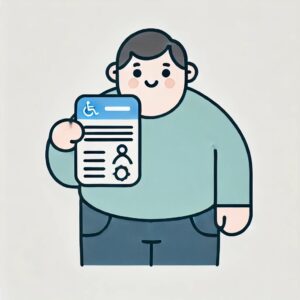 Fatphobia in the Medical Industry and How It Can Affect Your SSDI Claim
Fatphobia in the Medical Industry and How It Can Affect Your SSDI Claim
For people dealing with weight-related illness and who desperately need Social Security Disability Insurance (SSDI) benefits, it can feel like an uphill battle. But while weight and SSDI can impact each other, your weight shouldn’t keep you from getting needed benefits.
Fatphobia, or bias against people based on their weight, can have serious consequences on your health care and, in turn, your SSDI claim. But you do have options to protect yourself and get the benefits you need.
Understanding Fatphobia in Healthcare
Fatphobia in healthcare is a widespread issue where doctors and other medical professionals may judge patients negatively based on their weight. This bias can lead to unfair treatment, including:
- dismissing or downplaying symptoms
- blaming unrelated health issues on weight, and even
- refusing certain treatments.
For people who are overweight or obese, this can mean not getting the right diagnosis or treatment for a disabling condition.
As TIME reports, “Studies have shown that higher-weight individuals often experience shorter appointment times, less comprehensive exams, fewer referrals for specialists and imaging, and longer wait times for surgeries and other procedures.” They also may experience dismissive or even rude language about their size.
And as a result, many people who would call themselves fat avoid getting healthcare altogether – including preventative care, critical tests, and second opinions.
 How Fatphobia Can Impact Your SSDI Claim
How Fatphobia Can Impact Your SSDI Claim
First, it’s important to remember the SSA, which oversees SSDI claims, doesn’t approach your case as doctors. They won’t decide the success of your claim based on your weight or diagnose you at all. And even if your health problems tie directly to your weight, the SSA doesn’t care. All they care about is whether you have a disability that impacts your ability to work.
Instead, when you apply for SSDI benefits, your claim depends on the medical evidence you provide. This includes doctor’s reports, medical tests, and other documentation that shows how your condition affects your daily work life.
However, if your doctor dismissed your symptoms due to bias, your medical records may not fully reflect the severity of your condition. This can make it harder to prove your disability to the Social Security Administration (SSA).
For example, if you’re suffering from chronic pain, but your doctor just blames your weight without investigating other causes, your SSDI claim might not include the detailed medical evidence needed to show how disabling your condition truly is. This can lead to a denial of benefits, even though you’re genuinely unable to work.
What You Can Do to Protect Your SSDI Claim
If you suspect that fatphobia is affecting your medical care, it’s essential to take steps to protect your SSDI claim:
1. Seek a Second Opinion
If your doctor isn’t taking your symptoms seriously, consider seeing another doctor who has experience treating patients of all sizes with respect and care. A second opinion can provide the thorough documentation needed for your SSDI claim. Search for “fat-friendly doctors,” get word-of-mouth recommendations, and bring an advocate with you.
2. Document Everything
Keep detailed records of your symptoms, treatments, and interactions with healthcare providers. If a doctor dismisses your concerns because of your weight, note it down. This information can be useful if you need to explain gaps or issues in your medical records.
3. Work with an Experienced SSDI Lawyer
Navigating the SSDI process can be complicated, especially if you’re dealing with biased medical records. An experienced SSDI lawyer can help you gather the necessary evidence, advocate for your case, and make sure fatphobia doesn’t stand in the way of getting the benefits you deserve.
We recently helped a woman who desperately needed SSDI and had been rejected multiple times. She lived with serious disabilities, including some that were weight-related. We were able to prove her medical conditions kept her from working. And in an expedited case, we got her the benefits that she’d been denied for years.
 Why Choose Us?
Why Choose Us?
As a Memphis SSDI lawyer, I understand how biases like fatphobia can affect your health care and your ability to secure SSDI benefits. My goal is to make sure you receive fair treatment throughout the process.
I will work closely with you to build a strong case, challenge any unfair medical opinions, and fight for the benefits you need. We gather evidence, get expert testimony, and stand by your side every step of the way. And we only get paid if we win your case – a fraction of your past-due benefits, so you keep every dollar moving forward.
If you’ve been denied SSDI benefits, contact us today for a free consultation. Let’s work together to get the benefits you deserve.
